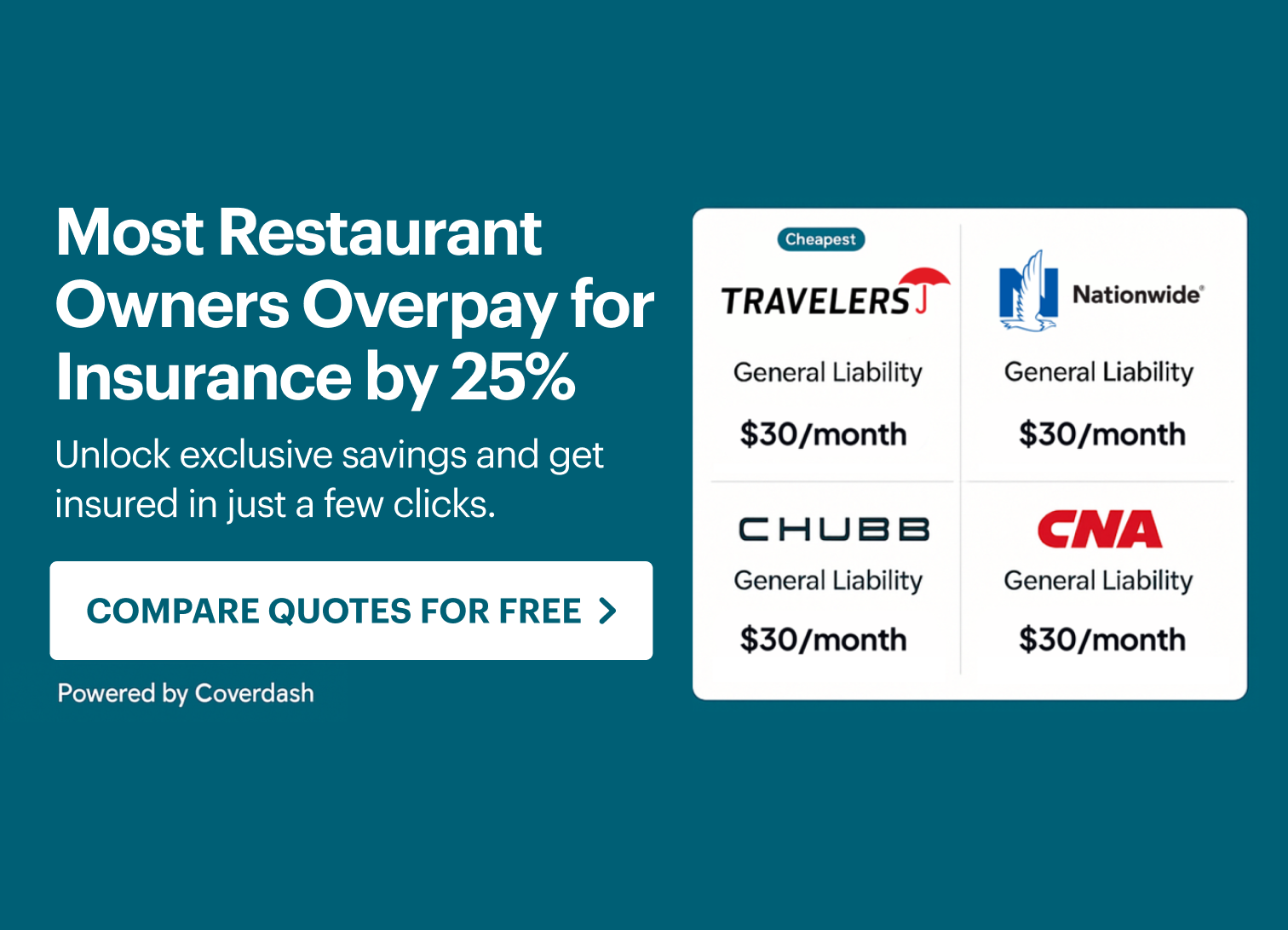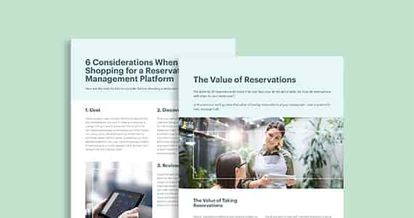In an ideal world, you can fund your restaurant yourself because you’re either independently wealthy, have investments you can cash in, or have made profit from another business that you can pour into your new restaurant.
But if you don’t live in this world – and let’s face it, a lot of us don’t – you still have options. In this section we’ll cover how to get money to open a restaurant as a new restaurateur, including:
- Family and friends
- Online lenders and SBA-guaranteed loans
- Grants
- Food incubators
- Investors
- Crowdfunding
- Banks and traditional small business loans (a.k.a. your last resort)
Before you start mining these channels for startup capital, you’ll want to make sure you’re prepared to answer investors’ and lenders’ questions about your business – specifically how you plan to make a profit within a certain timeframe. Here’s what you need to know about your business before raising capital.

Before Raising Startup Capital: How to Prepare
Before considering how to get a loan for a restaurant, the best thing you can do is to prepare, prepare, prepare. No matter the source, you’ll need the following items ready before you can start raising capital:
- Business plan
- Startup costs spreadsheet
- Financial forecast spreadsheet
Your business plan will tell potential investors and lenders about your business: market demand, differentiators, goals, milestones, etc.
Your startup costs spreadsheet will determine how much money you need from investors and lenders as a loan to open a restaurant.
Your financial forecast spreadsheet will communicate to investors and lenders how you plan to make your business profitable.
After you’ve prepared these documents, here’s what to ask yourself before seeking startup capital.
How much money do I have?
First, take a second to assess your own finances. How much of your restaurant can you reasonably fund yourself?
Also known as bootstrapping, self-funding leverages your own financial resources for startup capital. Self-funded capital can come in the form of gifts from family and friends, cashing in personal investments, your own savings account, or sometimes retirement savings.
While we don’t recommend drawing from your savings accounts unless your personal finances can take the hit, an assessment of how much money you have will inform how much money you need to start your business. You may be in a good position to fund some of your startup costs yourself, and just need a boost from investors and lenders to get you all the way there. Plus investing your own money signals to investors that you’re serious about your business, so you may actually want to explore this option as a way to attract investors.
If you think you might be in a position to use some of your own money to fund your restaurant, talk to a financial advisor about how you can safely use your own assets to fund all or a portion of your startup costs.
How much money do I need?
One of the worst mistakes a new restaurateur can make is failing to raise enough startup capital.
Remember
You never want to be in a position where you need money to stay afloat. Your access to capital is largely dependent on your ability to demonstrate profitability, so it’s much more difficult to raise funds when your business is in trouble. You need to ask for the correct amount of money, right from the start – you’ll thank yourself in the long run when you hit a rough patch and need the extra cushion.
After you’ve calculated your startup costs, add three months’ worth of operational costs to your final number – then double that figure. This amount is what you’ll need to raise in capital to financially secure your business against a worst-case scenario.
How do I plan to make profit?
Your business plan and financial forecast spreadsheet should answer this question. Consider this question your “North Star”, the ultimate goal you’re seeking to achieve by opening your business. While your motivation behind opening your restaurant may be rooted in a deep passion for food, your investors and lenders will be looking at your business through a much more pragmatic lens.
Your business plan should show your knowledge of your target market, the need you’re fulfilling with your restaurant, and the differentiators that make you more likely to succeed against competitors offering similar customer experiences. Your financial projections should demonstrate realistic assumptions about your business that lead to incremental profitability.
How much control am I willing to give up?
This is an important question to ask if you’re considering working with investors. When you seek capital from investors, you’re “trading” capital for a return on investment. And to ensure a return, your investors may ask for a say in how things are run or even partial ownership of the business. This way if things don’t go as planned, investors have a legal right to step in and right the ship in order to avoid losses.
When thinking about how to get a loan to start a restaurant, think deeply about what you’re willing to sacrifice for capital from investors. You’ll want to know your boundaries as a business owner before you begin the negotiation process, so you’re not caught off guard.
Startup Capital Options
Now that you have your business plan finalized, your start up costs and sales projections clearly defined, and answers to any and all questions about the viability of your restaurant – you’re ready to start raising capital for your restaurant. Here are your options on how to get funding to start a restaurant.
Family and Friends
Borrowing money from family and friends is a sticky subject. It’s easier than getting a loan from a bank or convincing investors who don’t know you to fund your business, but … the emotional stakes are a lot higher – and messier – when things don’t go as planned.
Here are the pros and cons of obtaining capital from family and friends, and how to do it if you decide it’s the right option for your business.
Pros
Flexibility
Your family and friends will likely be more flexible than a bank on the terms of your loan. While a bank loan won’t allow you to defer payment if your business isn’t doing so well, your family and friends may be more forgiving. They may allow you to make interest-only payments for a set period of time or delay payments altogether during the first few months of your business.
Lower interest rate
Your family and friends will likely ask for a lower interest rate than a bank would. Banks determine interest rate based on your past credit history, the economy, and the prime interest rate. Your family and friends will be more willing to establish an interest rate that works for you, regardless of your financial history.
Credit history and collateral unnecessary
A necessary part of getting a bank loan is proving you can pay it back. To get a loan you must provide the bank with your credit history and sometimes collateral in the event you can’t make payments. Family and friends are more likely to trust you without this proof because they know you personally.
Support network
Those family members and friends who are willing to lend you money to start your business are presumably people you are very close to. As a new business owner, you will experience self-doubt and situations that challenge your abilities as an entrepreneur. With family and friends on your side who also have a personal stake in your business, you’ll have access to a support network who can help you make thoughtful decisions when problem solving.
Cons
Lack of protection
While there are many benefits to opting out of a loan from a bank, you’ll also be losing some of the protection that comes with it. While loans from family and friends should always, always involve legal documentation outlining the terms of the loan, this process is less secure and leaves more room for grey area than the heavily regulated banking system.
Tax liability
Lack of clarity in your loan agreement can make your family and friends susceptible to tax penalties if it’s not clear you’re getting a loan from them. The Internal Revenue Service (IRS) may classify the loan as a gift, which would mean it’s subject to a gift tax.
But there’s good news: if you are receiving a gift instead of a loan, your donor is covered by an annual and a lifetime tax exemption. In 2017, any gift below $14,000 is exempt from the tax; in 2018, the amount rises to $15,000. For gifts that exceed this amount, your donor can tap into their lifetime exemption amount, which currently stands at $5.45 million.
For your startup capital to be considered a loan, you need to make sure you’re being charged a minimum amount of interest that is set by the IRS. These rates change monthly and can be viewed here.
Awkward social interactions
Picture this: you’re at a party with your best friend, who loaned you $50,000 to start your restaurant. You’re having a great time, the drinks are flowing, then all of a sudden … she asks how your business is going.
If your business is going well, the interaction is a piece of cake. But if your business isn’t exactly on the top of its game, answering this question in a social setting is awkward. Situations like this can also escalate if business continues to decline, and family and friends don’t have the same obligation to hold back on expressing exactly how they feel about lending you money. Mixing your business with your personal life means risking your personal relationships – be sure your family connections and friendships can withstand the conflict money can introduce.
How to ask your family and friends for startup capital
It’s important to treat family and friends like you would any other investor in your business. This means you need to undertake the same steps you would take if you were raising capital from someone who doesn’t know you.
Set up a meeting.
Just as you would with any other investor, set up a formal meeting and have a clear agenda going in. The nature of the setting will help set expectations for the potential partnership between you and your family member or friend.
Present your business plan.
Again, pretend like you’re presenting your business plan to an investor you don’t know. Provide as much detail as possible about your target market and your plans to turn your restaurant concept into a profitable business.
Explain the risks.
As part of your business plan presentation, make sure you explain to your family member or friend the risks involved in a loan. Don’t sugarcoat the truth just because you know them personally. Be ready to talk about how long it can take to turn a profit in the restaurant industry (3-5 years) so you’re setting clear expectations.
Draft a legal agreement.
Hire a lawyer to draft a legal agreement that clarifies the terms of your loan. An agreement should include the terms of your interest rate, late fees, and repayment. Make sure the agreement outlines each person’s legal obligations to each other.
Keep communicating.
Remember that you’re accountable to your family member or friend who is lending you the money. Make sure you remain candid in your discussions about your business to avoid any social awkwardness that can potentially damage a great relationship.
Online lenders and SBA-guaranteed loans
Traditional business loans require cash flow to demonstrate repayment, so the odds of your restaurant startup qualifying for one is small. But this doesn’t mean your restaurant is without options in the small business loan department – it just means you’ll need to investigate online lenders and SBA-guaranteed loans that match you with online lenders.
Online lenders are like banks, but they don’t have any physical branches – they can handle the entire application process for a loan online. An SBA-guaranteed loan is a program run by the U.S. Small Business Administration that matches small business owners with online lenders that are appropriate for them.
Pros
Fast funding
Online lenders offer a much faster turnaround time on loans than banks. If you need startup funding in a hurry, online lenders can deliver.
Higher approval rates
Online lenders tend to approve businesses for loans at a higher rate than banks.
Less of a need for collateral
While some online lenders may require collateral if your credit score is bad, there is less of a chance as compared to traditional personal or small business loans with banks.
Cons
Higher APR rates
Quick access, higher approval rates, and fewer barriers to entry come with a cost – a higher annual percentage rate (APR). Not to be confused with the interest rate, your APR reflects interest rate, points, fees, and other charges you’ll incur on top of the loan itself. Average APR rates from online lenders range between 7%–108% depending on the type and size of the loan and the repayment terms.
Where to get a loan
The U.S. Small Business Association (SBA) offers new businesses a service called “Lender Match” to match small businesses with online lenders. The service is free and all lenders are approved by the SBA. While Lender Match does not guarantee a loan, it’s a great way to start conversations with lenders who are likely to fulfill your needs. To participate you’ll need:
- Business plan
- Startup costs
- Credit history
- Financial projections
- Collateral (in some cases)
- Details about your industry experience
Kiva is a nonprofit that provides interest-free microloans to businesses that have friends and family members who are also lending to the business. After friends and family lend their own capital, Kiva opens the loan to its own lenders for additional funding.
LiftFund offers loans of $50,000–$250,000 to businesses in low- to moderate-income communities in 13 states. Your business can also qualify if more than 50% of your full-time staff is low-income, or if your staff live in low- to moderate-income neighborhoods.
Driven (formerly Thinking Capital)
Driven invests between $5,00–$300,000 in restaurants, and you can apply online. Since 2006, Driven and previously Thinking Capital, have helped more than 10,000 small to medium-sized grow.
If your restaurant is in New York City…
Business Center for New Americans
The Business Center for New Americans grants loans of $500–$50,000 to small businesses that are owned by newcomers to the United States in the restaurant industry. To participate, you need to present a startup budget.
Grants
They may be rare for restaurants, but grants are worth considering because of one thing: free money. While some grants may require you to report on how your business is doing to qualify for a repeat contribution, grants are largely no strings attached and definitely interest-free.
Pros
Free money!
If you qualify for a grant, make it through the application process, and stand out against your competition, then you’ve just scored some interest-free, no strings attached capital. Congratulations!
No collateral or credit history required
As granting agencies are not money lenders, they don’t require collateral or credit history for you to qualify. So if you have bad credit but can convince a granting agency of the viability of your business through the application process, you may be able to gain access to capital with a grant.
Cons
Rare
Grants to start a restaurant are rare. Grants are traditionally reserved for nonprofit organizations, and federal agencies are actually not allowed to issue grants to for-profit businesses. Grants for restaurants are instead provided by corporations or, in some cases, state agencies.
Difficult to qualify
Many grants are hyper-focused on funding businesses that serve a specific community need, and you may find your restaurant does not meet many of the grant’s qualifications.
Arduous application process
While you don’t need great credit or collateral to qualify for a grant, you will need to prove why your business is needed in your community and how you will be able to deliver on your goals. You’ll likely need to go beyond your business plan to make a case not just for the profitability of your restaurant but also the unique ability for your business to contribute to the overall goals of the granting agency.
Competitive
As it turns out, a lot of businesses want free money. And especially in the restaurant industry where grants are few and far between, your competition for grant money is fierce.
Grants for Restaurant Startup
Grants.gov is a great place to start searching for restaurant grants. Just be aware that many grants require your restaurant to have at least 100 employees or make an annual profit of $6 million.
State grants
Find your local economic development agency, like your local state department of revenue. You’ll likely find agencies that provide more information on the types of grants available in your state.
FedEx Small Business Grant Contest
The FedEx Small Business Grant Contest awards small businesses with up to $25,000 to grow their business.
Food Incubators
Food incubators are a great option for people who are not in a hurry to open their business and instead want an education before taking a big leap into restaurant ownership. Incubators teach people about running a business in exchange for a stake in future restaurant earnings. If you live in a city in the U.S., you probably have access to a kitchen incubator: nearly 60% of U.S. incubators are located in urban areas.
Pros
Education
If opening a restaurant is more of a long-term dream and you have a lot to learn, food incubators are a great place to get a crash course on everything you need to know to run a restaurant.
Networking opportunities
Being part of a food incubator means sharing space with other new and/or future restaurant owners, which means you’ll have plenty of opportunities to build connections in the industry. And as you probably already know, having access to other restaurant owners can lead to valuable insider knowledge that can help you avoid mistakes and maximize efficiency.
Cons
Incubator profits are declining
Many food incubators may not be around much longer. Due to high operating costs and a reliance on government grants, incubators are struggling to break even. Only 39% of for-profit incubators have made a profit, and only 57% report breaking even. Many others are operating at a loss.
Difficult to get in
Food incubators have limited space to offer, because a lot of people want to learn about how to open and run a restaurant. Some popular incubators have an acceptance rate as low as 2%.
Reliance on rental hours
If you’re looking to start your business out of an incubator, you’ll be competing for kitchen space. Most incubators require you to rent shared space, which means you’re beholden to other people’s schedules to run your business.
If your restaurant is in New York City…
Food-X is more of an accelerator than an incubator because it provides restaurant startups with $50,000 in capital in exchange for shares in the company. To gain access to the capital, a group of 10 restaurateurs (out of 300–500 applicants) qualify for a 14-week training program, during which they prepare for a final showcase in front of restaurant experts to gain access to capital. The process happens twice per year.
Investors
If you’ve decided you’re prepared to give up a portion of your ownership and autonomy in exchange for an infusion of capital, it’s time to approach some outside investors.
Equity investments trade startup capital for shares of your business. While you won’t be obligated to pay the investor back if your business fails, you are responsible for protecting their investment and giving them a certain level of control. Your investment partners are also assuming risk and personal liability for any debt incurred by your business – so it’s safe to say you’ll be accountable to them once your restaurant opens.
When investors contribute capital to your business, you need to think of ways to shield them from risk. A business that operates as a sole proprietorship becomes a general partnership when an equity investor becomes a part of the business as a co-owner – but this isn’t your only option when structuring and registering your business. Consider converting your business to one of the following to shield investors:
Corporation: Your investor becomes a shareholder who doesn’t participate in running the business and is free from liability.
Limited partnership: Your investor becomes a limited partner who isn’t involved in running the business and is free from liability.
There are many pros and cons to consider when approaching investors; here are just a few:
Pros
Expertise
The right investor will be someone who’s (almost) as passionate about your restaurant as you are. You’re likely to find an investor who has either been a restaurant owner or worked with other restaurant owners in the past. This means you’ll be able to draw on their expertise and increase your chance of success.
Large infusion of capital
If an investor sees potential in your business, you’re likely to see a large infusion of capital. The investor will want to secure a return on investment, so they will do what it takes to make sure your business succeeds.
No loans
The best part about investment capital is that it’s not a loan: you don’t have to pay it back, even if your business fails.
Cons
Accountability
Your accountability to your investors is high because of their stake in your business. Be prepared for constant communication and collaboration with investors. Your financial spreadsheets will always need to be updated for your investors, and you should be ready to report on all aspects of your business at any time.
Losing partial ownership
You may have started your own business so you could be your own boss – but bringing on investors means you lose partial legal ownership of your business.
High expectations
Investor expectations are high, simply put. They’ve invested a presumably significant amount of capital in your restaurant, so you’re required to meet their expectations – or lose the investment.
How to seek investors
Before you meet with investors, you need the following documentation polished and ready for presentation:
- Business plan
- Startup costs spreadsheet
- Financial forecast spreadsheet
Once these documents are final and you feel confident with your pitch to investors, here are some investors you can approach who specialize in restaurant investments.
Driven (formerly Thinking Capital)
Driven invests between $5,00–$300,000 in Canadian restaurants, and you can apply online. Since 2006, Driven, and previously Thinking Capital, have helped more than 10,000 small to medium-sized grow.
Located in Atlanta, GA, BIP Capital invests in many quick serve restaurants in the United States.
Located in New York, Los Angeles, and Boca Raton, Sun Capital is considered one of the most active restaurant private equity investors in the United States.
Crowdfunding
Have you been talking up your future business to a large personal network of friends, family, coworkers, and acquaintances? If traditional ways of raising startup capital haven’t worked out but you feel confident that your concept stands out enough to get people’s attention, crowdfunding may be the best option for you.
Pros
Not a loan
While you may need to come up with some creative ways to compensate people who have contributed to your campaign, it’s not a loan and there’s no need to pay it back.
Builds buzz
Crowdfunding is a great way to build excitement about your business before it opens. Marketing is built into crowdfunding because it requires a lot of smaller contributions by a large number of people, which leads to opportunities for media attention, social media virality, and word of mouth.
Creates networking opportunities
When you decide to crowdfund your restaurant, you’re also deciding to hustle: you’ll be letting everyone who’s anyone know how they can donate to your crowdfunding campaign. Crowdfunding creates opportunities for other people in the industry to discover your new business, and you may be able to capitalize on those connections and answer the question of how to get money to open a restaurant.
Cons
Public accountability
If people contribute to your crowdfunding campaign and you fail to reach your goal, your failure is public.
Unpredictable
Crowdfunding can be an unreliable source of income because there are no guarantees that your concept will resonate with potential contributors. While many crowdfunding campaigns are a resounding success, there are just as many – if not more – that have failed to reach their goal.
Time investment
Crowdfunding requires a significant investment in time to promote your campaign and deliver on your promises to those who have contributed. You may have committed a certain amount of free food to people who contribute a certain amount, and you may need to spend some time packaging and shipping product to people who aren’t local.
Crowdfunding platforms
Billed as the “only crowdfunding site created just for restaurants, breweries, cafes, food trucks, and other food business”, FoodStart lets you start a crowdfunding campaign that is made to reward contributors with food discounts, guaranteed tables, and behind-the-scenes tours of your restaurant.
One of the original crowdfunding platforms, more than 10 million people from all over the world have backed a Kickstarter project. They also have a section specific to food-related projects.
Banks and Traditional Small Business Loans
Here’s the thing about banks: you’re unlikely to get a bank loan or business line of credit because you haven’t yet opened your restaurant. Restaurants are considered high risk because of their high failure rate and operating costs, so banks have a tendency to shy away from providing new restaurants with loans. Consider banks a last resort on how to get money to open a restaurant.
Banks require restaurants to demonstrate a positive cash flow before granting loans, so you’re not likely to qualify for one if you’re not making any revenue. Here’s what might qualify you for a bank loan without cash flow:
- A large amount of collateral
- A large down payment
- Proven restaurant experience
- A perfect credit score
If you fit the profile above, here’s what you’ll need for your loan proposal:
- Business plan
- Loan request: the amount of money you need and why you need it
- Loan repayment request: the terms you want for your loan (interest rate, term, etc.)
- Collateral description
- Personal financial statements, such as tax returns from the last three years
- Financial projection spreadsheet
- Equity investment: how much of your own money you’ve invested in your business
- Lease
- Partnership agreements
- Business licenses and registrations
- Contracts with vendors
Note that the average interest rates for small business loans in 2017 are:
National banks: 6.24%
Small national and regional banks: 5.96%
What Not to Do to Raise Startup Capital
When looking on how to get money to open a restaurant, it’s just as important to know what not to do. As tempting as some of these options can be when you’re starving for capital, there are certain methods for raising money that you should avoid at all cost.
Re-mortgaging your house
Borrowing against an existing mortgage to raise startup capital puts your home at risk if your business fails. A failing business may be one thing, but it’s quite another to lose a business and a home at the same time.
Cashing in your retirement savings
Your retirement fund should not be used as startup capital unless you’ve spoken with a financial advisor who has a feasible plan for you to replace the funds.
Racking up credit card debt
Credit cards should never be used to fund a restaurant startup. Credit cards have high interest rates that make repayment difficult when charges start to rack up. You’re much better off qualifying for a loan at a reasonable interest rate than relying on credit cards to provide you with startup capital.
While it may be difficult to get financing for a restaurant, you still have many options you can exhaust before pulling too much money from your personal savings. Think of the restaurant financing landscape like many forks in the road: each is its own adventure, but they are all worth exploring for their potential.
And you’re going to want to explore: the more financing you can secure, the more stable your business will feel as you’re opening. So don’t shortchange yourself – pursue all available options.
Sign up for our free weekly TouchBistro Newsletter





